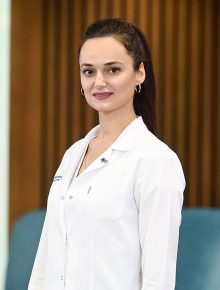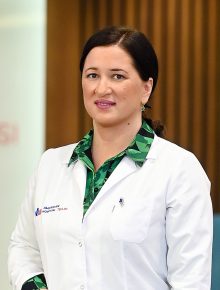American Hospital Tbilisi – AHT Department of Endocrinology is staffed by highly qualified specialists. Caring and nursing for patients with chronic disease is well-structured – in addition to consultation and diagnosis, their continuous supervision and dynamic monitoring is important.
The qualified medical staff of the AHT Endocrinology Department applies the principles of teamwork both in the department and in close collaboration with the American Hospital Endocrinology Surgery, Neurosurgery, and other departments.
In the Department of Endocrinology Surgery – Surgical treatment of pathologies of the thyroid gland, parathyroid gland, and adrenal glands, as well as neuroendocrine tumors localized in the pancreas or other parts of the digestive tract is performed.
In the Department of Neurosurgery – Trans-nasal, trans-sphenoidal excision of pituitary adenomas is performed.
The following diseases can be treated in the endocrinology department:
- Pituitary diseases;
- Thyroid diseases;
- Disorder of the parathyroid glands;
- The adrenal glands disorder;
- Polycystic ovary syndrome;
- Primary ovarian insufficiency syndrome;
- Osteoporosis;
- Type 1 Ddabetes mellitus;
- Type 2 Ddabetes mellitus;
- Metabolic syndrome;
- Disorders of lipid metabolism.
The school of diabetes successfully operates in the endocrinology department of AHT, where patients with type 1 diabetes have the opportunity to learn how to match rapid-acting insulin doses independently with a complete diet, change their insulin therapy regimen during physical activity and various intercurrent diseases.
Consultation with an endocrinologist is advisable when the patient experience the characteristic symptoms of this or that endocrine disease, or endocrine disease is diagnosed – for proper management and supervision.
The followings play a leading role in the diagnosis of endocrine diseases:
- Laboratory examination;
- Functional tests;
- Ultrasound examination of the thyroid gland, parathyroid glands, ovaries, abdominal organs;
- Magnetic resonance imaging of the pituitary gland, which is carried out for visualization of the pituitary gland with the most informative dynamic contrast;
- Computed tomography and magnetic resonance imaging of the adrenal glands;
- In the presence of a nodule with questionable ultrasound characteristics of the thyroid gland, fine-needle aspiration biopsy with ultrasound control and cytological examination of the sample is performed.




